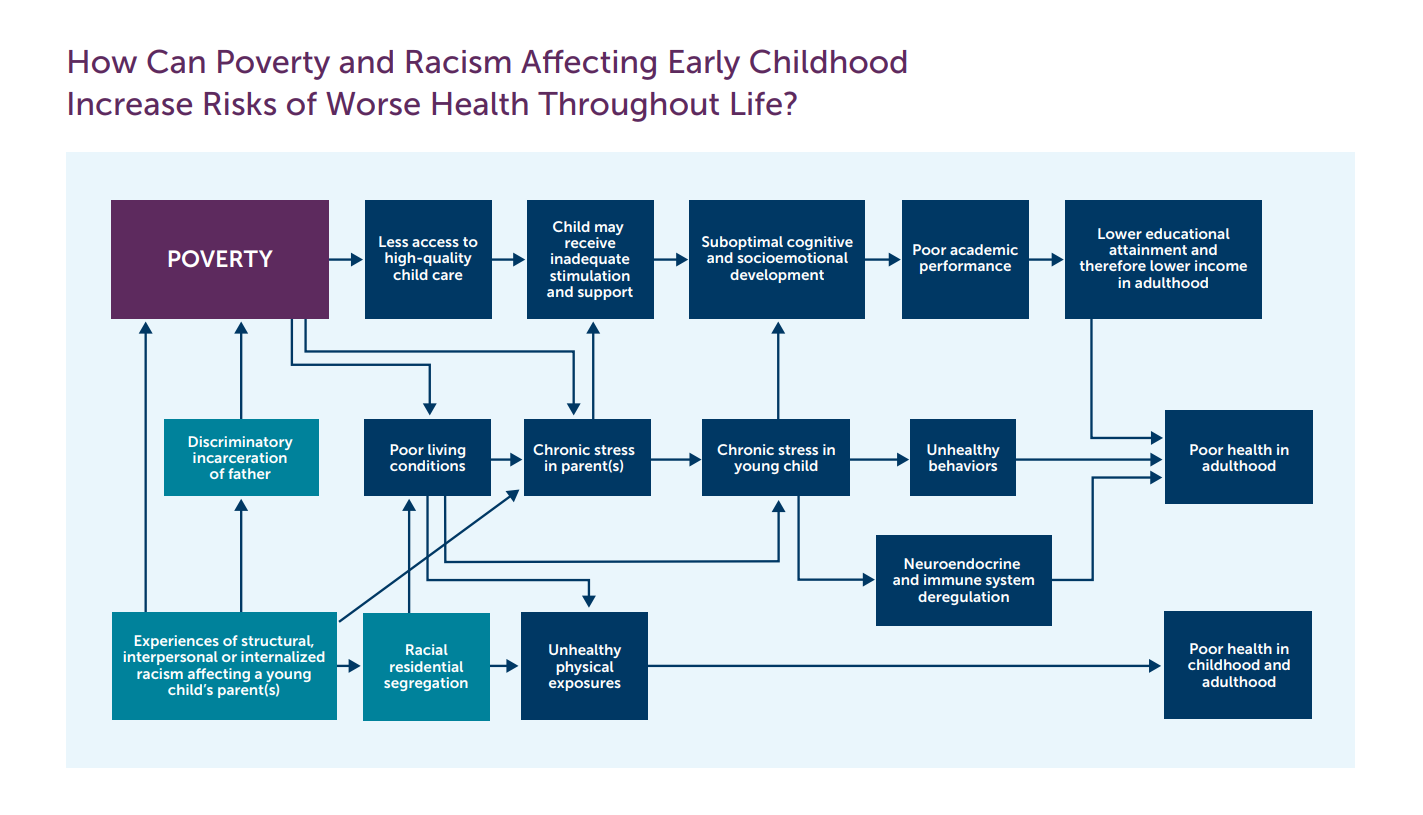
Share On Social!
Toddlers and preschoolers who grow up amid poverty and racism are at a developmental disadvantage and face lifelong social, health and economic consequences that hinder health equity, according to a new report from the Robert Wood Johnson Foundation (RWJF) and the University of California, San Francisco (UCSF).
This includes Latino kids, who are prone to hardships in early childhood.
Experiencing poverty and racism in the first five years of life can “set off a vicious cycle of inequities” from obesity, stress, and developmental problems that affect adulthood and future generations.
Fortunately, the report explores ways to overcome or prevent these damaging effects.
“Reducing child poverty, eliminating structural racism, and providing universal high-quality early care and education nationwide will be essential for breaking the cycles of disadvantage that create and perpetuate enormous health disparities across lifetimes and generations,” according to the report.
Inequitable Opportunities for Good Health
Health equity means that everyone has a fair and just opportunity to be as healthy as possible, according to the new RWJF and UCSF report.
But many Latinos and other communities of color don’t experience health equity.
Health inequities are produced by inequities in the resources and opportunities available to different groups of people based on race/ethnicity, income, education, gender and other characteristics tied to a history of being marginalized or excluded.
Inequities in the availability of resources and opportunities are due in large part to discriminatory housing and banking practices throughout the 1900s and into the 2000s. These discriminatory policies and practices relegated low-income and minority residents to areas with poorer housing and environmental quality, poorer access to transportation, and inferior schools, according to the report.
“Poverty experienced by young children often reflects parents’ lack of educational opportunities due to racial discrimination when they were children and young adults,” according to the report.
Poverty and Racism Can Compromise Children’s Development
There is an important distinction between poverty and poor people.
Poverty is the “state” of being poor, which in many communities in America means inequitable opportunity due to poorer housing quality, inferior schools and child care facilities, inferior streets and sidewalks, and poorer access to transportation. Poor people are people.
“Children disadvantaged by poverty are less likely to experience the benefits of positive health-promoting conditions, such as high-quality early care and education; safe streets and green spaces for physical activity; healthy foods; and role models who engage in healthy behaviors,” the report states.
Experiences of racism often lead to poverty and parallel poverty-related inequitable access to opportunities. They can harm health in other ways as well, like chronic stress, discriminatory preschool expulsions, and discriminatory incarceration of fathers.
“As a result of implicit or structural bias, children of color are more likely than others to be expelled from preschool for behavioral issues—often arising from experiences of trauma—that warrant supportive social and mental health services rather than punishment,” the report states.

Discriminatory suspensions and expulsions are particularly concerning in early childcare settings.
Additionally, Latinos and blacks are disproportionately stopped, ticketed, searched and arrested for/during a traffic violation than whites, even though they were less likely to be found breaking the law, resulting in burdensome and costly consequences.
“Unhealthy living environments can lower children’s resilience by compromising their immune and emotional regulation systems,” the report states.
What Can We Do to Boost Health Equity?
Breaking the cycle of health inequity starts by intervening in early childhood.
“[Intervening can interrupt the cycle linking] young children’s experiences of social and health disadvantage with social and health disadvantage throughout their lives,” the report states.
In addition to improving access to high-quality, affordable early care and education, it is important to support families and address child poverty and discrimination through strong social policies/programs.
These include affordable housing initiatives, criminal justice reform, paid parental leave, home-visiting programs, pediatric medical care sites, the Special Supplemental Nutrition Program for Women, Infants, and Children (WIC), the Supplemental Nutrition Assistance Program (SNAP), the Earned Income Tax Credit (EITC), and the Child Tax Credit (CTC).
The report includes an extensive list of examples of promising policies and programs and makes the business case for investing in early childhood.
Each $1 invested in preschool programs is estimated to return $2.88 to $17.07, depending on the program and length of follow-up. Each $1 spent on a pregnant woman in WIC is estimated to save up to $4.21 in Medicaid costs for her and her newborn.
“A larger investment in early childhood would benefit the overall U.S. economy by producing healthier, better-educated, and therefore more productive adults in the future,” the report states.
By The Numbers
84
percent
of Latino parents support public funding for afterschool programs




